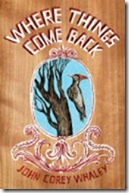 Where Things Come Back has been on my radar since it was published because it received so much local attention. The author, John Corey Whaley, is from Springhill, a tiny town an hour or so from Shreveport. I’ve been there several times, mostly because my childhood best friend’s mother grew up there, and I was always with my best friend.
Where Things Come Back has been on my radar since it was published because it received so much local attention. The author, John Corey Whaley, is from Springhill, a tiny town an hour or so from Shreveport. I’ve been there several times, mostly because my childhood best friend’s mother grew up there, and I was always with my best friend.
I don’t usually review local books (or read them) because most of them are a new kind of terrible. Seriously, y’all, some of this stuff might make your head implode. On example will suffice: Charlaine Harris. (Okay, I’m kidding. Everything she writes is terrible, but lots of people like her. I’m really talking about the mostly self-published crap that flies around this town.) I should note that some of it is good. Chris Jay wrote a fabulous collection of short stories, and William O. Cook wrote a great memoir called Honeysuckle, Creosote, and Trainsmoke. That said, I’m not well-versed in local writing simply because I’ve come to assume that I’ll hate it. That’s not a good attitude, but I don’t like wasting my time on bad writing, and I’ve read lots of it from around here. I won’t give names.
Anyway, back to Where Things Come Back. It’s an exception to the rule around here. It’s actually a pretty good book – I enjoyed reading it, and I think I gave it three stars on Goodreads, mainly because I think the end is kind of dumb. Don’t worry, I won’t spoil it.
Where Things Come Back is about a 17-year-old kid named Cullen Witter, whose brother, Gabriel, disappears, and how Cullen copes with that disappearance and gets through life as a teenager. It’s also about the search for the Lazarus Woodpecker (referring to the Ivory-Billed Woodpecker?), which is thought to be extinct. (Aside: When I was in fourth and fifth grade, I had a teacher who seemed a bit obsessed with this bird. She showed us John James Audubon’s painting. I still think about it sometimes.) And that’s it for my summary.
This novel is definitely worth a read. It’s a YA book, but there’s no reason an adult wouldn’t enjoy it, too. An added perk is that it’s a local (for me, anyway) book from northwest Louisiana that isn’t embarrassing. Don’t get me wrong: it’s not great literature, but it’s an enjoyable read and totally worth your time.